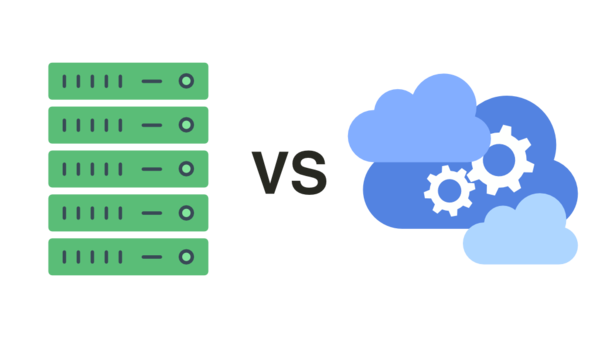
The right web hosting infrastructure is important as it determines the performance, reliability, and overall success of your online business. The struggle starts with choosing between whether you need traditional hosting, i.e., in-house hosting or cloud hosting.
In this article, we shall understand the difference between in-house server vs. cloud server to help you buy web hosting services for your business.
What is In-house or Traditional Web Hosting?
The traditional or in-house server is built on physical infrastructure that is usually owner-operated and maintained by the company, in the company’s premises, or sometimes in data centers.
Usually, just infrastructure is built for internal use, and configuration is customized. This means the hardware software and operating system are customized and built as per the company’s needs.
What is Cloud Hosting?
Cloud hosting builds complete infrastructure on the Internet, which means the Internet is a support system that facilitates cloud communication. This means rather than keeping your website data on a single server, i.e., traditional practice, it is spread across various servers in different places.
You get to access your website data through a virtual machine that communicates with different servers that are spread across the cloud.
What is the difference between In-house Hosting vs. Cloud Based Hosting?
- Server
In in-house web hosting, the whole infrastructure is built on private premises, whether it is an office or a data center. The dedicated IT team and infrastructure can have exclusive control with complete responsibility for maintenance, upgradation and installation.
On the other hand, with cloud server hosting, you save on the cost of allocation of exclusive space for server maintenance. You also do not get complete control over the infrastructure, and the complete maintenance, upgradation, and installation are the responsibility of the provider. No technical knowledge is required as the server is virtual and maintained by the provider.
- Access to server
With an in-house server, you don’t need the internet to access your data; just a running server is enough. However, remote access is limited, and centralizing data across multiple locations is not possible.
But with cloud hosting you get remote access with just an internet connection and proper authorization. It frees you from physical limitations, allowing access from anywhere you want.
- Scalability
With an in-house server, you can have scalability challenges. Although you get your own server, which facilitates complete control, upgrading can be expensive. Therefore, scalability requires planning for physical space, checking compatibility, and a time-consuming installation process, which may slow down your business.
On the other hand with cloud hosting, scaling up is much easier. You get a hassle-free experience, ensuring quick upgrades within a few hours and no business slowdown.
- Security
In-house servers might lack essential security measures against cyber threats, while cloud providers offer better protection with features like intrusion alerts and firewalls.
So, if your company deals with sensitive data and wants complete control, then an in-house server is an ideal choice, as there is no third-party involvement.
But for small businesses with limited capital, cloud hosting is a more accessible option.
- Backup
When it comes to data backups, the cloud has an advantage. Most cloud providers offer regular backups, ensuring quick recovery in any situation.
In-house hosting is more vulnerable to accidental data loss, whereas cloud hosting provides optimized backups, even as frequently as every 15 minutes, preserving your precious data.
Conclusion
The choice between a cloud vs. an in-house server depends on your specific needs. Cloud servers are great for small or medium businesses, avoiding hefty upfront IT investments, while in-house servers are suitable for organizations seeking greater control over their IT infrastructure.






